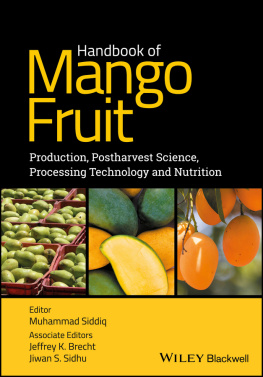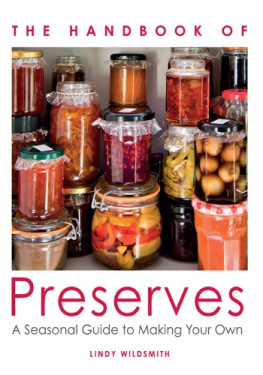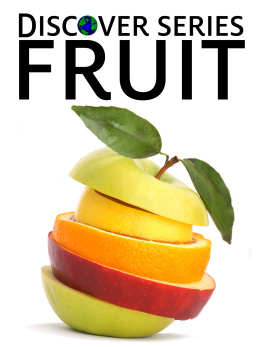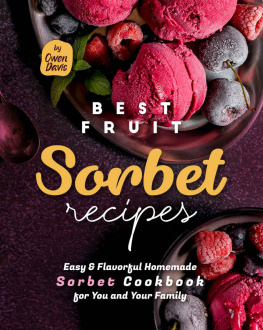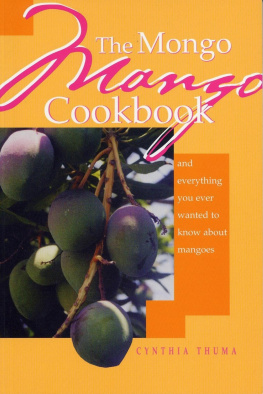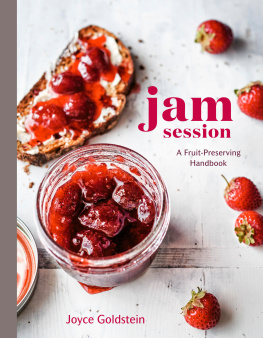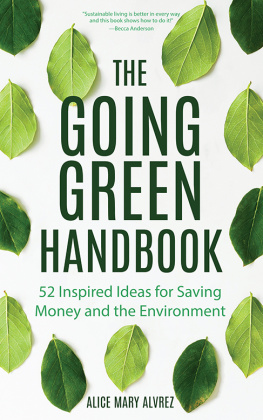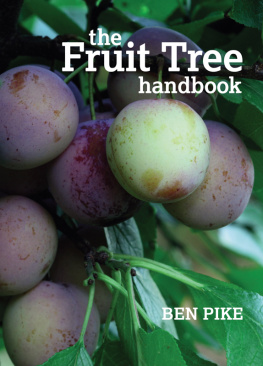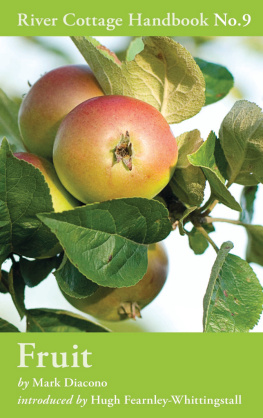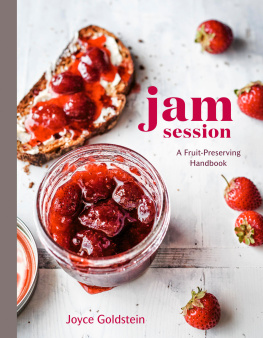SIDDIQ - Handbook of Mango Fruit
Here you can read online SIDDIQ - Handbook of Mango Fruit full text of the book (entire story) in english for free. Download pdf and epub, get meaning, cover and reviews about this ebook. City: S.l, year: 2017, publisher: JOHN WILEY & SONS, genre: Politics. Description of the work, (preface) as well as reviews are available. Best literature library LitArk.com created for fans of good reading and offers a wide selection of genres:
Romance novel
Science fiction
Adventure
Detective
Science
History
Home and family
Prose
Art
Politics
Computer
Non-fiction
Religion
Business
Children
Humor
Choose a favorite category and find really read worthwhile books. Enjoy immersion in the world of imagination, feel the emotions of the characters or learn something new for yourself, make an fascinating discovery.
Handbook of Mango Fruit: summary, description and annotation
We offer to read an annotation, description, summary or preface (depends on what the author of the book "Handbook of Mango Fruit" wrote himself). If you haven't found the necessary information about the book — write in the comments, we will try to find it.
Handbook of Mango Fruit — read online for free the complete book (whole text) full work
Below is the text of the book, divided by pages. System saving the place of the last page read, allows you to conveniently read the book "Handbook of Mango Fruit" online for free, without having to search again every time where you left off. Put a bookmark, and you can go to the page where you finished reading at any time.
Font size:
Interval:
Bookmark:

This edition first published 2017
2017 John Wiley & Sons Ltd
All rights reserved. No part of this publication may be reproduced, stored in a retrieval system, or transmitted, in any form or by any means, electronic, mechanical, photocopying, recording or otherwise, except as permitted by law. Advice on how to obtain permission to reuse material from this title is available at http://www.wiley.com/go/permissions.
The right of Muhammad Siddiq, Jeffrey K. Brecht and Jiwan S. Sidhu to be identified as the authors of the editorial material in this work has been asserted in accordance with law.
Registered Offices
John Wiley & Sons Ltd, The Atrium, Southern Gate, Chichester, West Sussex, PO19 8SQ, UK
Editorial Office
9600 Garsington Road, Oxford, OX4 2DQ, UK
The Atrium, Southern Gate, Chichester, West Sussex, PO19 8SQ, UK
For details of our global editorial offices, customer services, and more information about Wiley products visit us at www.wiley.com.
Wiley also publishes its books in a variety of electronic formats and by print-on-demand. Some content that appears in standard print versions of this book may not be available in other formats.
Limit of Liability/Disclaimer of Warranty
The publisher and the authors make no representations or warranties with respect to the accuracy or completeness of the contents of this work and specifically disclaim all warranties, including without limitation any implied warranties of fitness for a particular purpose. This work is sold with the understanding that the publisher is not engaged in rendering professional services. The advice and strategies contained herein may not be suitable for every situation. In view of ongoing research, equipment modifications, changes in governmental regulations, and the constant flow of information relating to the use of experimental reagents, equipment, and devices, the reader is urged to review and evaluate the information provided in the package insert or instructions for each chemical, piece of equipment, reagent, or device for, among other things, any changes in the instructions or indication of usage and for added warnings and precautions. The fact that an organization or website is referred to in this work as a citation and/or potential source of further information does not mean that the author or the publisher endorses the information the organization or website may provide or recommendations it may make. Further, readers should be aware that websites listed in this work may have changed or disappeared between when this work was written and when it is read. No warranty may be created or extended by any promotional statements for this work. Neither the publisher nor the author shall be liable for any damages arising herefrom.
Library of Congress Cataloging-in-Publication Data
Names: Siddiq, Muhammad, 1957- editor. | Brecht, Jeffrey K., 1942- editor. | Sidhu, Jiwan S., editor.
Title: Handbook of mango fruit : production, postharvest science, processing technology and nutrition / edited by Muhammad Siddiq, Michigan State University, USA, Jeffrey K. Brecht, University of Florida, USA, Jiwan S. Sidhu, Kuwait University, Kuwait
Description: Oxford, UK : Wiley, 2018. | Includes bibliographical references and index. | Description based on print version record and CIP data provided by publisher; resource not viewed.
Identifiers: LCCN 2017011132 (print) | LCCN 2017011768 (ebook) | ISBN 9781119014386 (pdf) | ISBN 9781119014379 (epub) | ISBN 9781119014355 (cloth)
Subjects: LCSH: Mango. | BISAC: TECHNOLOGY & ENGINEERING / Food Science.
Classification: LCC SB379.M2 (ebook) | LCC SB379.M2 H36 2018 (print) | DDC 634/.44-dc23
LC record available at https://lccn.loc.gov/2017011132
Cover Design: Wiley
Cover Images: (left to right) Courtesy of Dr. Jeffrey K. Brecht; nine_far/iStockphoto; RUJITOP/iStockphoto
Mango is one of the most consumed fresh fruits in the world, with production occurring in more than one hundred countries. Global production of the fruit has more than doubled in the last three decades. There are over one thousand different varieties of mangoes, giving rise to various shapes, sizes, colors, textures and nutritional properties. The mango market and trade has grown considerably since the 1990s, with the two major import markets being the United States of America and European Union countries. Since the mango fruit has made its way into mainstream market outlets in most of the developed countries and is available year-round, it is no longer classified as exotic. The year-round availability of the fruit is attributed to several factors, including the fact that the fruit is grown under diverse climatic conditions, which allows harvesting throughout the year, and improvements in transportation, market access, pre-harvest production practices, and postharvest treatment allow the crop to be shipped long distances relatively free of any pests and diseases. Demand for mangoes is also on the rise, as more health conscious consumers incorporate the fruit into their diets, based on its nutritional value and unique flavor. Along with the increased consumption of this nutrient-rich fruit, the processed mango market has also seen similar growth, especially in fresh-cut fruit, juice and beverages, and shelf-stable dried products.
This book provides a contemporary source of information that brings together current knowledge and practices in the value-chain of mango production, postharvest handling, and processing. This value-chain approach to the topic is the unique feature of this book, with an in-depth coverage on a wide variety of pertinent topics: production, harvesting and GAPs, postharvest entomology and pathology, postharvest physiology and storage, packaging technologies, processing and processed products, innovative processing technologies, nutritional profile and health benefits, bioactive and phytochemical compounds, and value-added utilization of mango by-products. An experienced team of over 30 contributors from Asia, North America, and South America has contributed to this book. These contributors come from a field of diverse disciplines, including horticulture, crop sciences, plant pathology and entomology, food science and technology, food biochemistry, food engineering, nutritional sciences, and agricultural economics.
The editors acknowledge many individuals for their support from conception through to final development of this book. Foremost is our sincere thanks and gratitude to all authors for their contributions and for bearing with us during the review and finalization process of their chapters. We are grateful to our family members for their understanding and support, enabling us to complete this work. We dedicate this work to the worthy contributions of the numerous researchers and students throughout the world, for their decades long devoted efforts to improve the quality and utilization of fresh mango and its processed products.
Muhammad Siddiq
Jeffrey K. Brecht
Jiwan S. Sidhu
- Poonam Aggarwal
- Department of Food Science and Technology
- Punjab Agricultural University
- Ludhiana, Punjab
- India
- Ender Arserim
- Department of Food Science, Rutgers
- The State University of New Jersey
- New Brunswick, New Jersey
- USA
- Fredy H. Ballen
- Center for Tropical Agriculture
- University of Florida, IFAS
- Homestead, Florida
- USA
- Suresh Bhise
- Department of Food Science & Technology
Font size:
Interval:
Bookmark:
Similar books «Handbook of Mango Fruit»
Look at similar books to Handbook of Mango Fruit. We have selected literature similar in name and meaning in the hope of providing readers with more options to find new, interesting, not yet read works.
Discussion, reviews of the book Handbook of Mango Fruit and just readers' own opinions. Leave your comments, write what you think about the work, its meaning or the main characters. Specify what exactly you liked and what you didn't like, and why you think so.

